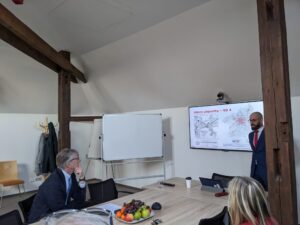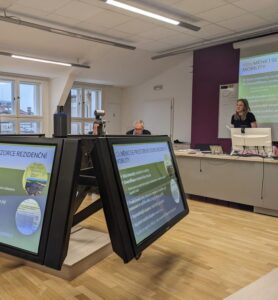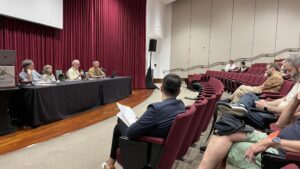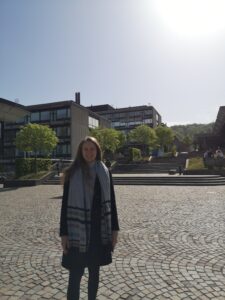Author: Marie Horňáková
New scientific articles published during the autumn
During autumn, members of our research team published several peer-reviewed articles. All of them we recommend to read. Some of them are in open-access form, so they should be available to everyone.
Public, private and the pandemic: Everyday life in large housing estates during the COVID-19 lockdowns
- Authors: Slavomíra Ferenčuhová, Marie Sýkora Horňáková, Jana Kočková, Petra Špačková
- More
Movement matters: uncovering life-course similarities and differences in residential environment perspectives
- Authors: Marie Sýkora Horňáková, Jan Sýkora, Pavel Frydrych
- More
New scientific articles published during the summer
During the summer months, members of our research team published several peer-reviewed articles. All of them we recommend to read. Some of them are in open-access form, so they should be available to everyone.
Suburban Autonomy? The Case of Inter-Suburban Commuting Outside Prague
- Authors: Jiří Jakub Zévl, Martin Ouředníček
- More
A shape-based heuristic for the detection of urban block artifacts in street networks
- Authors: Martin Fleischmann, Anastassia Vybornova
- More
Decoding (urban) form and function using spatially explicit deep learning
- Authors: Martin Fleischmann, Daniel Arribas-Bel
- More
Movement refrains of people with visual impairments: A post-phenomenological geography beyond space and place
- Authors: Lucie Pospíšilová, Pavel Doboš, Robert Osman
- More
ESA EXPRO grant on urban fabric of Europe
We are pleased to announce that a research consortium led by Dr Martin Fleischmann has been awarded a grant to study the structure of cities in Europe in space and time. The project, funded by the European Space Agency, will be carried out in collaboration with academic partners from The Alan Turing Institute, led by prof. Dani Arribas-Bel, and the OECD Geospatial Lab, led by Dr Claudia Baranzelli, and with partners from policy (The Prague Institute of Planning and Development) and practice (4ct).
During the 12 months of the project, the team will develop the the methodological basis for the development of a continental scale urban fabric classification that can be unfolded in time using artificial intelligence applied to Sentinel 2 satellite imagery.
The total value of the funding is €250,000.
Doctoral internship at the University of Toronto
 We are very happy that our team members (PhD students) gain experience abroad! A few weeks ago, Niloufar Ghafouriazar, completed a three-month doctoral internship at the University of Toronto’s Geography and Planning Department as an international visiting graduate student. She took a course on Qualitative Data Analysis and concentrated on applying grounded theory qualitative methods in urban studies under the supervision of Professor Zachary Hyde.
We are very happy that our team members (PhD students) gain experience abroad! A few weeks ago, Niloufar Ghafouriazar, completed a three-month doctoral internship at the University of Toronto’s Geography and Planning Department as an international visiting graduate student. She took a course on Qualitative Data Analysis and concentrated on applying grounded theory qualitative methods in urban studies under the supervision of Professor Zachary Hyde.
We have several new PhDs on the team!
In the last three years, we have welcomed three new PhDs to our team. We just forgot to let you know. Congratulations to all of them, of course, and we look forward to seeing who will be the next successful PhD graduates.


2024
Adam Klsák – Dynamika rezidenční diferenciace a segregace cizinců v metropolitních areálech Česka

2023
Marie Horňáková – Residential mobility and residential preferences of young families and older adults from the Prague Metropolitan Area

2022
Jiří Nemeškal – Denní mobilita a socioekonomické aspekty regionů a jejich vliv na funkční prostorovou organizaci společnosti
2024 AAG Annual Meeting Honolulu
 At the end of April, the Annual AAG Meeting took place in Honolulu (Hawaii). The themes of this year’s AAG connected meeting and academic offerings to the ecologies, history, and cultures of the host location in Hawai‘i, affirming the interconnectedness of place and beings here and around the world. These themes shaped keynotes and special events during the meeting. The three main themes were:
At the end of April, the Annual AAG Meeting took place in Honolulu (Hawaii). The themes of this year’s AAG connected meeting and academic offerings to the ecologies, history, and cultures of the host location in Hawai‘i, affirming the interconnectedness of place and beings here and around the world. These themes shaped keynotes and special events during the meeting. The three main themes were:
- Reciprocal Scholarship
- Colonialism and Resources
- Recovery and Restoration

Adela Petrovic’s Transient Doctoral Research Journey at SURB
Our team member, Adela Petrovic, since February 2024, has embarked on a six-month doctoral fellowship at Social Geography and Urban Studies (SURB), University of Zurich.She is delving into the complexities of gentrification dynamics and urban transformation processes under the supervision of Professor Hanna Hilbrandt.


4EU+ Seminar: Urban planning and development – looking for the bridge between science and practice
Don’t miss the February seminar “Urban Planning and Development – Finding the Bridge between Science and Practice”. The event is prepared in the framework of the 4EU+ Alliance by the project team Urban Regulations and Political Memory: Towards an Understanding of the Spatio-Temporal Aspects of Urban Development PLUS. The focus will be on spatial planning from different perspectives – geographical and legal – in three countries: Czechia, Italy and Poland. Karolina Wojciechowska, Martin Ouředníček and Zdeňka Havlová will be among the presenters.
- Date: 21 February 2024, 13:15-14:45
- Form: online
Newly published articles
Late last year and during January 2024, several new papers were published by members of our research team.
“Wait, really, stop, stop!”: Go-along interviews with visually disabled people and the pitfalls of ableist methodologies
- PORKERTOVÁ, H., OSMAN, R., POSPÍŠILOVÁ, L., DOBOŠ, P., KOPECKÁ, Z. (2024): “Wait, really, stop, stop!”: Go-along interviews with visually disabled people and the pitfalls of ableist methodologies. Qualitative Research. [online first]
- This paper explores the challenges involved in conducting interviews with people with visual impairments in geographical research of blind people’s experiences of urban space.
Having a garden or being in the city? The trade-offs and strategies of young middle-class families in Prague
- HORŇÁKOVÁ, M., ŠPAČKOVÁ, P. (2024): Having a garden or being in the city? The trade-offs and strategies of young middle-class families in Prague. Journal of Urban Affairs. [online first]
- Using the concept of life pathways, the study explores the process of decision-making about moving to a post-socialist city and how housing needs and preferences intersect with what is affordable for young middle-class families.
In praise of (spatial) bundles
- ARRIBAS-BEL, D., FLEISCHMANN, M. (2023): In praise of (spatial) bundles. Environment and Planning B: Urban Analytics and City Science, 51, 1, 3-6.
- This is an editorial that focuses attention on an approach to the classification of (urban) landscapes called spatial bundles.
Clustergram: Visualization and diagnostics for cluster analysis
- FLEISCHMANN, M., (2023): Clustergram: Visualization and diagnostics for cluster analysis. Journal of Open Source Software, 8, 89, 5240.
- This paper presents a Python package called clustergram that provides tools for analyzing clustering solutions and visualizing observation behavior in relation to a tested range of class count possibilities, enabling a deeper understanding of the behavior of observations divided into classes and more informed decision making about the optimal number of classes.
Inequalities in experiencing urban functions. An exploration of human digital (geo-)footprints
- CALAFIORE, A., SAMARDZHIEV, K., ROWE, F., FLEISCHMANN, M., ARRIBAS-BEL, D. (2023): Inequalities in experiencing urban functions. An exploration of human digital (geo-)footprints. Environment and Planning B: Urban Analytics and City Science. [online first]
- This study uses high spatial-temporal resolution data provided by Spectus.ai to investigate how the level of deprivation in the area where people live affects the types of urban environments they are more likely to use for their daily activities.